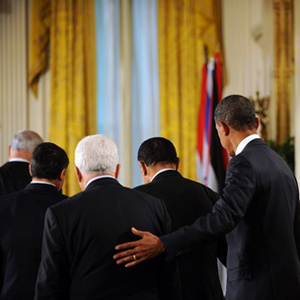Is Iran the Real Problem?

But the failure of such photo-op negotiations lies mostly within the nature of the problem. The right of return for Palestinian refugees, expanding Jewish settlements, and the future status of Jerusalem are problems hardly related to Iran and its ideology. Washington and Tel Aviv may be well aware of this fact while pointing the finger at Tehran. But Iran seems quite gifted to play the role of the scapegoat.
The truth is that any peace agreement –however far-fetched its prospects may appear at the moment- will just lead to a blind alley, as long as Palestinian groups have reached no consensus amongst themselves. Unity between Palestinian factions, especially Hamas and the PLO, is a must, a fact that perhaps Tel Aviv also admits, as it knows that even in the case of a likely deal with Mahmoud Abbas, he will need domestic support to enforce the agreement. Ironically, Palestinians’ unity will remove any possible excuses by Israel to not participate in peace talks or enforce the binding agreements.
How about the Arab League? Does the organization follow a united stance on Palestine? Consensus among members of league, particularly Egypt, Jordan, Syria and Saudi Arabia as the key regional decision-makers, is imperative. This not being the case today is exacerbated by the indifference of Arab African states (Morocco, Algeria, Djibouti…) and the marginal role of Qatar, Kuwait and other Persian Gulf states. A larger Islamic body, the Organization of the Islamic Conference (ICO), also stands split over the issue.
Not much will be gained unless the above challenges are not overcome. Nonetheless, not even unity among Palestinians, Arab League members, and the ICO will bring about peace in the Holy Land. The only attainable goal at the moment is reaching an agreement to continue negotiations; that is, ‘injecting’ goodwill into the peace talks until the time for resolving differences over basic bones of contention comes.
Currently, even once marginal groups such as the Popular Front for the Liberation of Palestine (PFLP) and its offshoot, the General Command, are now supporting Hamas, complicating an already knotty problem.
Washington, of course, relentlessly accuses Iran of impeding the Middle East peace process. Iran’s nuclear program also helps Americans spice up the story, portraying Iran as a threat to any opportunity to forge a better Middle East. Palestinian resistance is serving as Iran’s proxy, Washington and Tel Aviv claim, to give the Islamic Republic leverage against the US in their age-old areas of conflict. And Israel? ‘Dovish’ Israel is ready for reconciliation. That is a given, according to the script.

